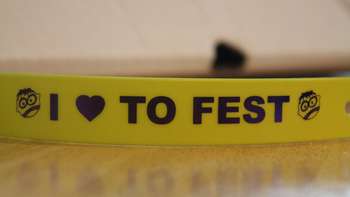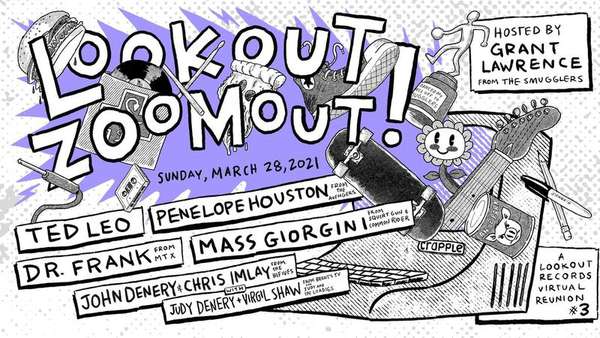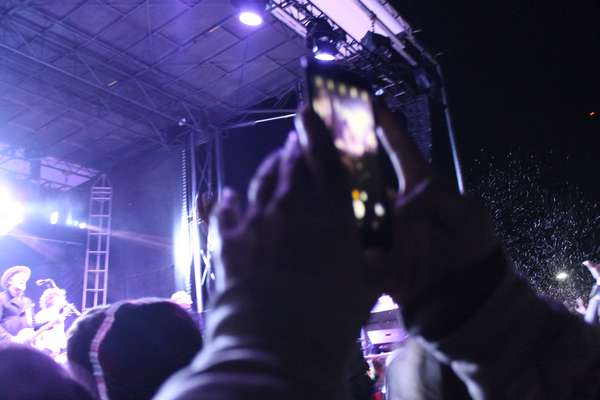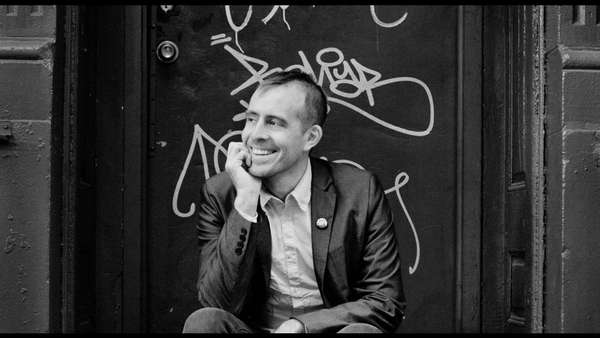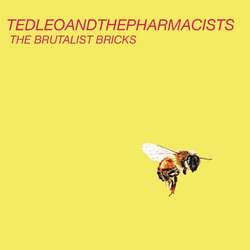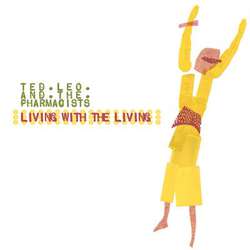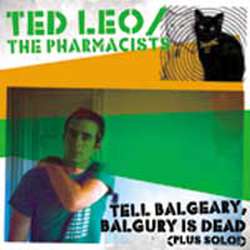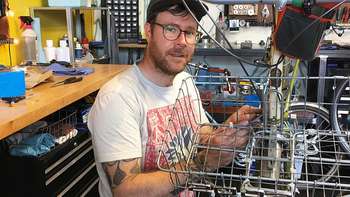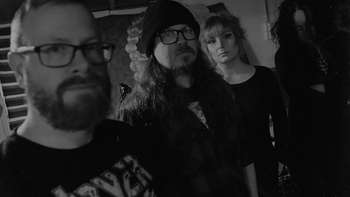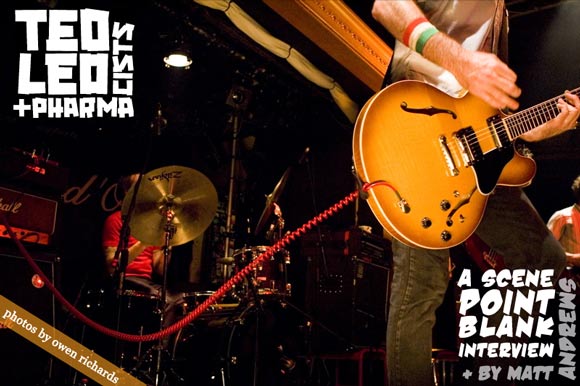
Everyone calls Dave Grohl the nicest man in rock, but they've evidently never met Ted Leo. Perhaps 'nice' is the wrong word though: the New Jersey musician is one of the most energetic, engaging, passionate and genuine artists to emerge in the indie/punk scene for quite some time. Touring like a relentless music machine and armed with a back catalogue of organic rock and roll influenced by everything from Thin Lizzy to Crass, Ted Leo and his Pharmacists are easily amongst the most exciting bands still making music.
It was with this in mind that SPB sat down to chat with Ted on a rainy evening in Leeds. Midway through their European tour (to make up dates from a cancelled visit last summer), the band were in good spirits and seemed glad to be back in the UK. Matt met Ted and chatted about a bunch of topics, including politics, war, arrogance and English degrees.
Scene Point Blank: Hey Ted! To open up with, how's the U.K. tour been so far?
Ted Leo: Good, man, it's been hectic a little bit, but great, actually. We started in Ireland, which I think is always a good thing for us to do from now on, because we haven't been over there that much. It's surprising because we haven't been over there that much, but our shows there wind up being really fun and it puts me in a good mood for the rest of the trip, you know? Compared to the last trip which we had to cancel, the last U.K. section... that was just fantastic because we're actually doing it. Every day has been a little bit of a rush, some minor snafus that on another tour might be bothering everybody a little bit more, but since we're actually surviving and able to make it to the shows and play them on this trip, I think everybody's doing really well actually.
Scene Point Blank: Any news? Are we going to hear any new songs?
Ted Leo: Yeah, we've got some new stuff that we're working on. We've got a lot of music; I just have to get around to writing some lyrics first for it. We've been playing a couple of new songs on this trip, which are on the kind of... poppier side of the spectrum, I think that we're shooting to record a record in the beginning of June. And I think the way things are going writing-wise... it's really simple, a lot of it very short and almost... Pink Flag, Wire-y... I mean, the songs aren't that short, but they're that kind of... we're just settling back into just writing some short punk songs, and it feels really good. The stuff we've been playing on this trip is a little more... developed and on the poppier side of things.
Scene Point Blank: I know that when you wrote Shake the Sheets, your intention was to write some more stripped-down, shorter songs in response to the longer ones on Hearts of Oak. On Living With the Living we have all these long songs once more? is this the same thing again but in reverse?
Ted Leo: I guess in some ways it kind of is. I think the difference between what I'm writing now and Shake the Sheets is that... for as long as I've been writing songs, I've been trying to cram all of the things that interest me and move me into every song, so even the really short songs are like... oh, it's kind of a hardcore song, or it's a punk song, or it's kind of an indie song... like Badfinger-y pop songs, or there's reggae elements or folky elements. And with Shake the Sheets I was trying to strip everything down and write a more concise record, but I still tried to do everything that I could with every song, you know? I think that making Living With the Living, even though I went back to writing some longer songs and letting things flow a little bit more, I also started to not try and cram every influence into every song. For instance, there's a reggae song on there that instead of making it a punk/reggae song, I was like "You know what? I just wanna write a reggae song, so I'm just going to let it be a reggae song", you know? It was the same thing with "Bomb.Repeat.Bomb", I just kind of want this to be a hardcore song, so that's what it's going to be. Yes, having done a long record with really long songs, I do think I am going through that same process of wanting to go the opposite direction in the next record, but I'm also taking a step forward from that record, and not trying to do everything with every song again, just make everything a little simpler.
Scene Point Blank: When I first heard "Bomb.Repeat.Bomb", it was totally unexpected, like a mixture of The Dismemberment Plan and Stephen Colbert (Ted laughs). Was it a little scary releasing something like that before the record was out?
Ted Leo: Well, I'm going to say no, because while I understand how it differs from everything else, it's just like... a little more screamier, a little less melodic. I don't think it's extremely different from a lot of stuff that we've done before. It's just a little more aggressive. Also for me, I'm twenty years into making music now, and I started out in like, blastbeat hardcore bands, so it doesn't feel strange for me to do stuff like that, it feels like... liberating, like I'm not being strange, you know? It's like, "Oh yeah, that's still in me, I'll let it out!" you know? But also, I don't know if you know the specific history of that song, but in the period between Shake the Sheets and Living With the Living I wrote the music for a musical that was about U.S. involvement in Central America in the 50's and the overthrow of the government in Guatemala, and the banana trade, and all this stuff. The director kind of dropped off the map and the project never happened, but I had all this music and that was one of the songs that grew out of that project. By the time I decided to put it on Living With the Living I had already lived with that song for a year or something, so it was actually the oldest song on the record.
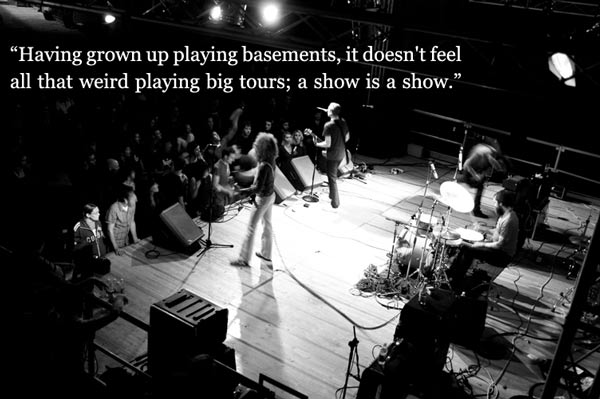
Scene Point Blank: How was it working with Brendan Canty on the new record? Did that bring anything different to the mix?
Ted Leo: Yeah. Well, I also did The Tyranny of Distance with Brendan, back in whenever that was, 2000/2001, something like that. Actually, I did the EP before that with Brendan too, Treble in Trouble. He's been a really good friend of mine for years and we, I think, see eye-to-eye about music in ways that I don't with a lot of other people. We have a language that he can finish a lot of my sentences, like if I'm having trouble describing a sound I want to get, or experiment I want to try, whatever. Not only does he usually know what I'm going for, but he also is a really fun guy to work with in terms of experimenting himself. Like, he's just up for anything. So yeah, it felt very comfortable. We did a tracking for three or four days with the whole band, and then Dave and Chris were done so it was Brendan and I for ten days, living together and just getting... maybe a little too drunk every night (laughs), just finishing everything, and it felt really comfortable, it was nice.
Scene Point Blank: One thing I always wonder about bands with an obvious frontman is how they start out like that. Like? do you ever feel arrogant being Ted Leo with your backup Pharmacists?
Ted Leo: Yeah, sometimes I do feel a little bit arrogant actually, to be honest with you. It's something that I try to find the right balance with, because I don't want to come off as arrogant, I don't want to be arrogant. This project, Ted Leo and the Pharmacists, grew out of me playing solo, for many years in the States. From the time when I quit this band called Chisel which I was in '97, really until we started touring on the Tyranny of Distance, which would have been summer 2001, I was mostly just playing alone. Everything I'd built to that point was just me and my guitar, except for the fact that I had a lot of songs that I thought were better served with a band, so I would record everything myself and I'd play with backing tapes and stuff. And then I did the Tyranny of Distance record with Lookout! and it was just like... this should be done live with a band. So I started playing with Chris and Dave, who only just left us this last August, and James Canty, who's back playing with us again now. It was a really interesting dynamic for a long time because we were all geographically separated too, so songwriting just kind of naturally lent itself to me writing alone and then us getting together, learning the songs and stuff. But also, I just got really lucky, falling in with musicians where we all enjoyed playing with each other and we all became really great friends. So, I don't think it's ever hit a point where I come in with my songs... it's not like I give people a score that they have to play to. If I have a suggestion about an idea that I want somebody to do, I can suggest it, and by the same token, there've been plenty of times when the opposite has happened, like Chris would say, "Yeah, you know, what if I did this and it would kind of change the song in this direction, what if that happened?" And I'm like, "Yeah, it's a great idea". We've been riding this sometimes awkward but sometimes cool middle way of doing things for a while. Now, we're all actually back around New York, and in the writing of this new stuff, I think one of the reasons it's taken on this more simply organic sound for us is that we're actually playing together a lot more, so the songs are still generally starting with me having an idea, but I've been kind of purposely bringing unfinished ideas to the table so we can work on them together, which used to not really be able to happen by virtue of the fact that we all lived in different cities on the East Coast.
Scene Point Blank: You mentioned Dave leaving? how has that affected the band?
Ted Leo: Well, it was time, you know. Dave didn't want to be on tour anymore, and he was very unhappy it seemed. Our schedule was so rigorous that I wasn't about to confront him about it. It was rough timing-wise, because he told me he wanted to quit the band right before we had this tour in August in the States booked, and he didn't even want to do that. I was like, "We need you", so he did that with us, and that gave us a little bit of time to get ready for the fall, and Marty, who's playing with us now, has also been a friend for years, been in tons of bands, toured with tons of bands, so we kind of got lucky again in finding a guy who we're all friends with, work well with, who could slide right in. The only problem is that we've been touring so much, so we can play a pretty long set, but we can't pull from our entire back catalogue. Like, with Dave, if anybody yelled anything out in the audience, we could go, "Alright, let's do it!", but we haven't quite got to that part with Marty yet, but we're working on it.
Scene Point Blank: A slightly personal question for me, I know you studied for an English degree? I'm just about to graduate from mine, and I'm worried that it's going to be no use to me in everyday life. Obviously your lyrics are full of literary references, but how does it benefit you as a musician?
Ted Leo: Hmm... that's a really good question (laughs). I mean, in my opinion, the greatest thing that I got from my course of study, the things that I focused on going back to before university, was just learning how to think, how to think critically. Specifically, in terms of the English degree, I love language. I just think it's an amazing creation and tool. I love being able to put things into words; sometimes I use too many words because I love words. I don't regret having gone through that course of study. I regret a lot of things about school, and where I went and the things I went through, but not about the course of study that I chose.
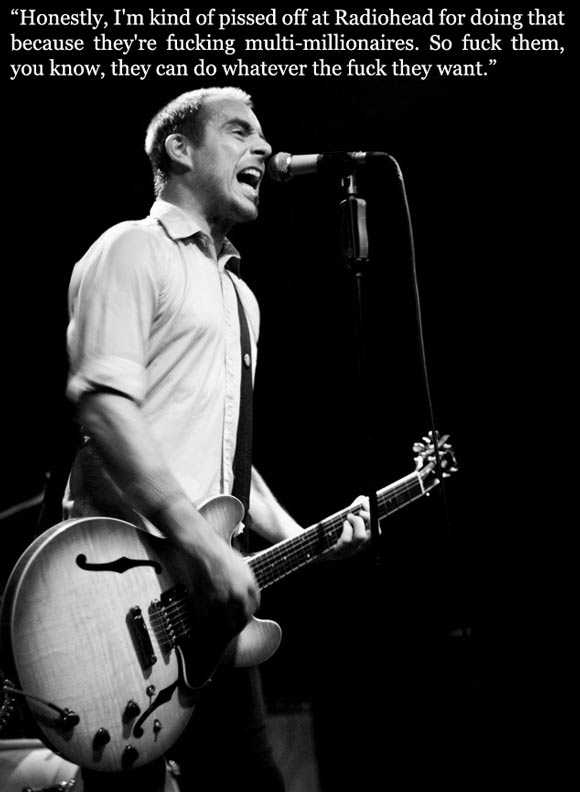
Scene Point Blank: I saw online recently that you've been booked to open up for Pearl Jam. How do you feel about something as huge as that?
Ted Leo: Honestly, I'm hugely conflicted about the whole thing. I mean, from all accounts that I hear, Pearl Jam are really nice guys, they very actively try to take out indie and punk bands with them. At the same time, it's a world that I've actively chosen to not be a part of for most of my life, so... you know, I won't deny that it's flattering to be asked, and I figure... what the hell, I mean, everybody that I've spoken to who's ever been involved with them in any capacity, even a passing acquaintance, speaks very highly of them as people, so how bad could it be? It'll challenge our comfort zones. And in terms of going from like, playing to what will probably be a half-empty room at the Cockpit tonight to playing to sold out Madison Square Garden, it's always like that for us anyway. I mean in the States, an average tour for us is... thousands of people in the Northeast/New York, to fifty people in Fargo, North Dakota. It's just the nature of the beast. Again, not to make too much of this, but having grown up playing basements, it doesn't feel all that weird; a show is a show. It's harder to shift to the big shows than it is to downshift. It'll be interesting, but I figure... how bad could it be? We've played at festivals before... it'll be weird, but hopefully it'll be cool as well.
Scene Point Blank: Yeah. I spoke to Against Me! and they talked about opening for Green Day and playing shows for people who go to one concert a year who just didn't get what they were about. I hope that doesn't happen for you.
Ted Leo: I wonder about that, yeah. The thing about Pearl Jam, at least, I think they've developed a reputation for cultivating who their opening acts are, like Sleater-Kinney, Buzzcocks, all these kind of bands... so their fans have become interested in who they choose to bring out, it's always someone that most of their fans aren't familiar with.
Scene Point Blank: When Living With the Living came out, there was a bonus EP, Mo' Livin'. Was that always the plan or was it more intended as a tribute for the fans who went out first to get it?
Ted Leo: That's exactly what it was. It was a complete afterthought, but it was a thing that once we were done with the record, we know it's going to be passed around to half of our audience, so for the people that do go out and buy it, it's the one cover and four other songs, so I was like, "We're going to bang out a bunch of new songs and give an extra EP with it." And if anyone bought the vinyl they got a free download of it.
Scene Point Blank: I have to say? when the album leaked, I was really torn between wanting to hear it but wanting to wait for it to come out. I had it downloaded on my computer but couldn't bring myself to open it?
Ted Leo: You don't have to do that in the future. (Laughs)
Scene Point Blank: In terms of music downloading, where do you stand on it? I know it's a clichéd question.
Ted Leo: But it's a good question to keep asking, it's such a shifting landscape. I mean my own feelings are continually evolving on it. I'm continually conflicted. It's so hard to say how one is benefiting from it, how one is being hurt from it, what are the positive or negative aspects of it. I can say this: this last year in particular, I have found it somewhat frustrating that our live audience has grown greatly, but our record sales have stagnated. You have to chalk that up to downloading, but at the same time, at least your live audience is growing. It's one of these back-and-forth things. Unfortunately for a band like us, I feel like we kind of live in this weird nether region where we've finally, just in the last three years, finally gotten to a point where everybody can pay most of their bills. Everybody still works when they can when they're at home, but it's become almost a living, to do this. Just as we're all getting just old enough that the curtain is starting to close a little bit (Laughs), how much longer can we keep doing it? And just at that moment is when we really feel a true pinch. We're not selling so many records that we can just write it off, the things that we lose from downloading. It's not like when Napster first came on the scene and I was playing to literally two-ten people most nights, turning around a loan, and just to know that somebody was sharing my stuff on the Internet, I was chuffed! "Oh my god! Yeah! That's mah stuff man! Somebody cares! They're sharin' it with somebody else, that's great!" And in some ways I still feel that way, I just wish there was some other method for surviving. And the answer is, you go get another job, but then the other flipside to that is that we can't tour as much as we do. There's this constant back and forth of pros and cons, and honestly, I've given up trying to sort it out. At this point I'm like... I just need to keep writing songs; that's what I need to keep doing. However it all shakes out, I'll just keep rolling.
Scene Point Blank: What about the sorts of methods used by Radiohead or Nine Inch Nails recently?
Ted Leo: Well I think it's unfair. Honestly, I'm kind of pissed off at Radiohead for doing that because they're fucking multi-millionaires. So fuck them, you know, they can do whatever the fuck they want. It makes it harder for everybody else to try to figure out a workable idea. It's like a red herring or a cul-de-sac to me to go down that road. Now, if the whole world becomes 'you release your music for free' and playing live becomes the way that you get compensated for it, then so be it. But it's not at that stage right now, and the overhead for actually making a record with a label and putting it out still requires an investment, and nobody wants to lose money. Nobody wants to fucking wind up in the gutter in a year or two. The Radiohead thing also was like a weird scam in my mind because they knew that they were going to be releasing the hard copies of the record eventually. It's bizarre man.
Scene Point Blank: It annoys me that they get all the credit when bands like Bomb the Music Industry! have been doing it for years?
Ted Leo: And so was Public Enemy; Public Enemy's been doing it for years as well. And that's a whole different model, that's just like 'you know what, we're just giving our shit away on the Internet. You wanna come to the shows... and we're self-releasing our record, etcetera etcetera.' We're not quite in a position to be able to accommodate either model properly, like having big label support or doing things completely gratis. It'll shake out as it will and we'll roll with it.

Scene Point Blank: I recently watched the Naudet brothers' documentary ?9/11' and was struck by a scene where a firefighter commented that he wanted to ?go out and kill' or words to that effect. In light of that, do you think the 21st century is the era of the ?righteous war', where those provoking it really believe they're doing right and good?
Ted Leo: I think that if George W. Bush had not been President, it would not be. I was there... I was loading ships on the docks in Jersey City with relief material to bring over there for the week afterward. People I went to high school with died that day... my only point being that I was there. And I'm telling you right now man, the spirit in the region, the New York region... until George W. Bush came on the scene and it became a national event, the spirit was in no way, shape or form aggressive or antagonistic or war mongering. Everyone was just taking a deep breath. It was extremely circumspect. The memorials that popped up around the city in the immediate aftermath of the event were explicitly... explicitly calling for... not war. It had a very anti-militaristic, anti-violent sentiment. And that pervaded the whole region, I'm telling you right now. Of course there are people who're going to be like, "I'm ready to kill, I wanna kill," but the overarching sentiment was not about war. It became a national thing; the media fans the flame, that's the way it goes. Our President had an agenda that went back to long before he was in office. It's not a fuckin' conspiracy theory, this is documented fact that the Iraq agenda was on the table by this organization called the Project for the New American Century, PNAC... which had been pushing this for years. They found their man in office, and they changed the entire zeitgeist of the world. If he had not been in office, their man wouldn't have been there. Fox News wouldn't have been able to do what it did; it wouldn't have been able to practice its jingoistic, yellow journalism like they did in the Spanish-American war, like they fuckin' did in every war. So my answer is simply that: it's still very early in this century, and my hopes are that America itself is not so far gone down that road that this next election will continue the pattern and make it worse. I don't understand how he ever won, but I really don't understand how he won the second election, and the second election, in fairness to the American people, he won by the smallest margin of any sitting American President ever. So there's still half of the fucking country that hates the man's guts, and probably more that are just too chicken to vote against him while we're in the middle of some military action. So my hope is that the answer to your question is no. The other component though... is that honestly, it's not a popular thing to say, but you've got to take religion outta the picture. And this is not directed solely at Al-Qaeda and Islamists' sentiments, this is absolutely about Christianity and pretty much anyone who feels they have a mandate from some divine power to... I don't wanna say 'enforce their will', that's kind of a trite statement, but it feels that they have the moral high ground, and can therefore justify things like killing and they're a religion. That's going to be... ironically, the end of evolution will be religion. (Laughs) I feel like it's really got to be... put in its proper place, if we're not to have a century of war.
Scene Point Blank: You answered that better than I asked it. Anyway, Myspace is responsible for a huge surge in the careers of lots of new bands, like The Arctic Monkeys in the U.K., but a lot of them are missing out on the years of work before playing arena tours. How do you think that'll affect the future of music?
Ted Leo: That's a good question too, and also one I don't think I have the answer for. I think it's brilliant that bands can do what The Arctic Monkeys did, which is outside of the system...
Scene Point Blank:...except it's owned by Rupert Murdoch?
Ted Leo: Yeah, you're in Rupert Murdoch's system, but outside of the record system, and I respect that, man, I think it's cool that kids can do that these days. Having said that, I will pull the 'crusty old man' card out a little bit and say that as old-fashioned as this, I value hard work, (in old Irish dude accent) "Oi tink it builds character." (Laughs) I think there's something to be said for slugging out for more than a tour and a van, before you get a trailer, and more than a tour and a trailer before you get a bus. There's something to be said for that, but at the same time, certain people handle that transition well and others won't... what are you going to do? I'm too old to worry about that. (Laughs)
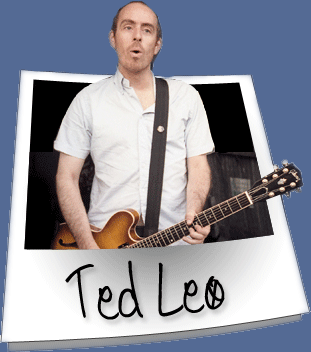
Scene Point Blank: I read recently that Red Star Records are re-releasing some Chisel demos.
Ted Leo: What?
Scene Point Blank: Er?haven't you heard?
Ted Leo: No I haven't. Who's Red Star Records?
Scene Point Blank: Um? I read it on Punknews.org... It said they're re-releasing demos and stuff from Chisel... have you literally heard nothing about this?
Ted Leo: I have literally heard nothing about this. Alright... I remember this Red Star Records thing, I think I told them that I would give them a song for a comp, but if they're releasing Chisel stuff they better fuckin' tell me about it, for the record.
Scene Point Blank: I guess that changes that question...
Ted Leo: Way to drop a bomb on me. (Laughs)
Scene Point Blank: So moving on? what does the typical Ted Leo fan look like for you? Has it changed?
Ted Leo: You know, it hasn't changed. But it's also impossible to pin down. Another thing that we're really lucky about is crossing a lot of lines that get drawn in the punk and indie world. It's the same in the States, but I think a really good example is our show in Dublin the other night. There were kids there with Crass patches and Zounds t-shirts, and then there were also normal hair gel looking' dudes who had obviously just come from work who were fans, who were singing along. That's a joy man; that's great. It's impossible to pin down what our fans look like because you do have that spectrum at most of our shows. I'm very glad for that. That makes you feel good.
Scene Point Blank: How do you reconcile Ted the activist with Ted the pacifist?
Ted Leo: Well, I'm not necessarily a pacifist to be honest with you. I think that war on a grand scale is... pointless and evil. But honestly, it's not like I won't personally fight if I have to (Laughs). It's a matter of degrees I guess, abuse, who's being used and by whom. While I would always seek to find the non-confrontational out of a situation, sometimes people literally won't let you find a non-confrontational way out. I'm a) not going to let my face get kicked in the dirt, and b) not going to let my friends' faces get kicked in the dirt. That's on a very personal level. On anything that moves into any sort of societal realm, yes, I would generally come down on the pacifist side of things.
Scene Point Blank: It seems like Living With the Living was written during a time of political stagnation. With the current elections going on now, has that acted like fuel for the fire and inspired you?
Ted Leo: Honestly, not so much. I wish that it was inspiring me more, but the level of dialogue that has gone on - with the exception of Barack Obama's pointed speeches that he's given - the level of dialogue that has gone on surrounding all of the same fuckin' issues that are always on the table in the States: war, healthcare and taxes. War, work, healthcare, taxes. War, work, healthcare, taxes. When he gives a stump speech, he treats these things in the grander, visionary way that I wish they would get treated when we're actually having debate about it. When debate goes on so far in this election cycle, it becomes mired down in exactly the kind of political discussions that everybody I think is... well, I shouldn't say everybody, but I am actually sick of. Which is this very personal kind of 'what are you going to do for me?' politics. We wind up spinning the same wheels over and over and over again, and I haven't been particularly inspired. At the same time, on a street level, there's still nothing going on. We're getting constantly and consistently lied to about what's happening in Iraq... it's off the front of the news cycle at this point, we barely even hear about it when a bomb goes off or whatever anymore. It's defeating. It's not inspiring. My hope is that with a new administration, things can get inspiring again. But the lead-up to it winds up being just as defeating to me as the last couple of years have been.
Scene Point Blank: Last summer you cancelled half of your U.K. tour. In terms of your personal life, is it difficult to discuss issues in a dialogue to a crowd as opposed to in a song? Does it feel like it's expected of you?
Ted Leo: Yeah. It depends on what kind of mood I'm in. What happened to me last year, what actually happened to somebody else last year that I needed to rush home to... it was of a nature that I really am not super comfortable laying out publicly. Nor do I think that the person who's involved would appreciate it if I did. Yeah, it really just depends on the circumstances, you know. It's interesting because you draw the distinction between putting something in a song and speaking something or writing something on a website or whatever about it, in a direct way, and, it's rare that I've felt like I've had to draw that distinction before. I don't really know that I'm drawing that distinction about it right now, like I'm not really writing songs about this. I guess it just depends on the circumstances.
Scene Point Blank: I guess what I'm saying is, and I cringe to use the word, it's almost like you're a celebrity, and suddenly personal life becomes a factor.
Ted Leo: I know what you mean. Yeah, because the audience is going to take that for what it is, which is a song, and however literally they take it, there are places you're 'allowed' to go that don't feel as awkward. We don't cancel shows unless we absolutely have to, and in situations like that I feel we owe people an explanation. I'm not enough of a celebrity to keep that distance from the people that we're playing for, I mean, physically, not even conceptually. I do feel compelled to give explanations but it doesn't feel invasive, it hasn't gotten to that point. I don't feel like anything's creepy or invasive, people that I think know who we are and appreciate what we do, it's fun and they enjoy it, but they kind of take it as seriously as we do so I feel like they deserve some explanation. But nobody bugs me about stuff like that.
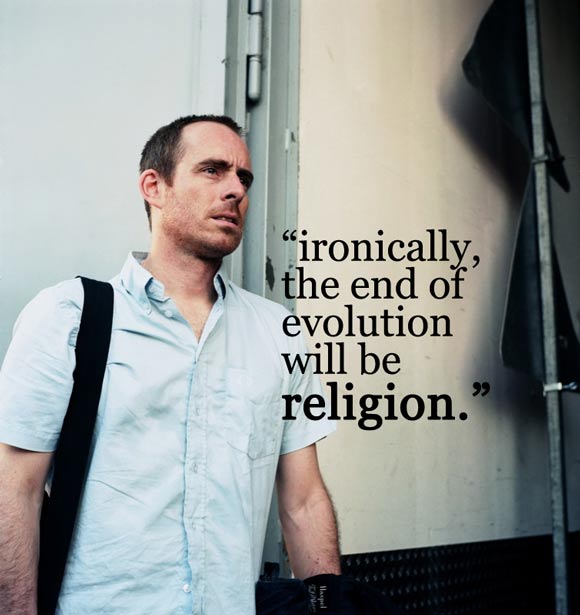
Scene Point Blank: You guys play quite a few covers: how do you choose them?
Ted Leo: Yeah, generally it's just songs that I at one point in my life, or like yesterday just thought it'd be fun to cover and we just do it, as simple as that. Sometimes for example, with The Mekons song that we're going to do tonight, that just came about because we were listening to The Mekons in the van and we were like, "You know, we should fuckin' cover this song. It'll be fun to play!" and we take a sound check or two to learn it then do it.
Scene Point Blank: I saw recently that The Specials are re-uniting. I know you're a fan (Where Have All The Rude Boys Gone? pays homage) but where do you stand on older bands getting back together? The Sex Pistols are notorious for it?
Ted Leo: I have mixed feelings and I think it goes case-by-case. I would never begrudge anyone the right to play their music at any point in their life. I dread to think about if I stopped playing music for a certain period of time, then I decided I wanted to again, I would hope that I wouldn't have to feel awkward about doing that. But of course, cynically, you always have suspicions about why people are doing it, and that can color your impression of whatever given reunion. I try to give everybody the benefit of the doubt because they deserve it, and who am I to judge, you know? (Laughs)
Scene Point Blank: Do you think you'll you go see them?
Ted Leo: I don't know, honestly. I'm assuming they'll come to the States later, so I'll probably read some reviews first. (laughs). Inform my opinion.
Scene Point Blank: What sort of stuff are you listening to currently?
Ted Leo: Let's see... the last few weeks, The Nazz, Todd Rundgren's old really psyche band, kind of like The Who but a little more psychedelic going on. They were from Philadelphia, 60's... I've recently been working with Kristeen Young; she toured with Morrissey for years. She's got a new record coming out that I played some percussion on and helped mix and stuff, and I've been listening to that and I think it's great. Listening to Daft Punk [playing in the club as we speak]... Ohhh, yeah, I just recently got a bunch of old stuff that had been missing from my collection, this old U.K. punk band called Crisis, a lot of that... a lot of Rich Kids, late 70's/early 80's punk stuff. But that's always on deck, you know.
Scene Point Blank: One last question: in terms of your music, if I had to pick one adjective to describe it, it would be "hopeful." What are you hopeful for?
Ted Leo: Honestly man... I'm glad that you say that because I try to keep it that way, but I'm in a particularly hopeless state of mind right now, to be honest with you. I don't mean to bum you out. (Laughs) I'm hoping that I'll come out of this tunnel, but I don't see things going all that well in a lot of areas of life right now. I'm nervous about how the US elections are going to go, and that's going to affect the whole world for the next fifty fuckin' years. My personal life is a shambles. (Laughs), I'm having trouble writing lyrics... Ask me again next year and I might give you a better answer.
Scene Point Blank: Thanks a lot for the interview Ted.
Words and Graphics: Matt | Wonderful photography by: Owen Richards (http://www.owenrichards.co.uk is featuring a Ted Leo tour photo zine - check it out)
Special thanks to Alison at Hermana and Sarah for questions!






